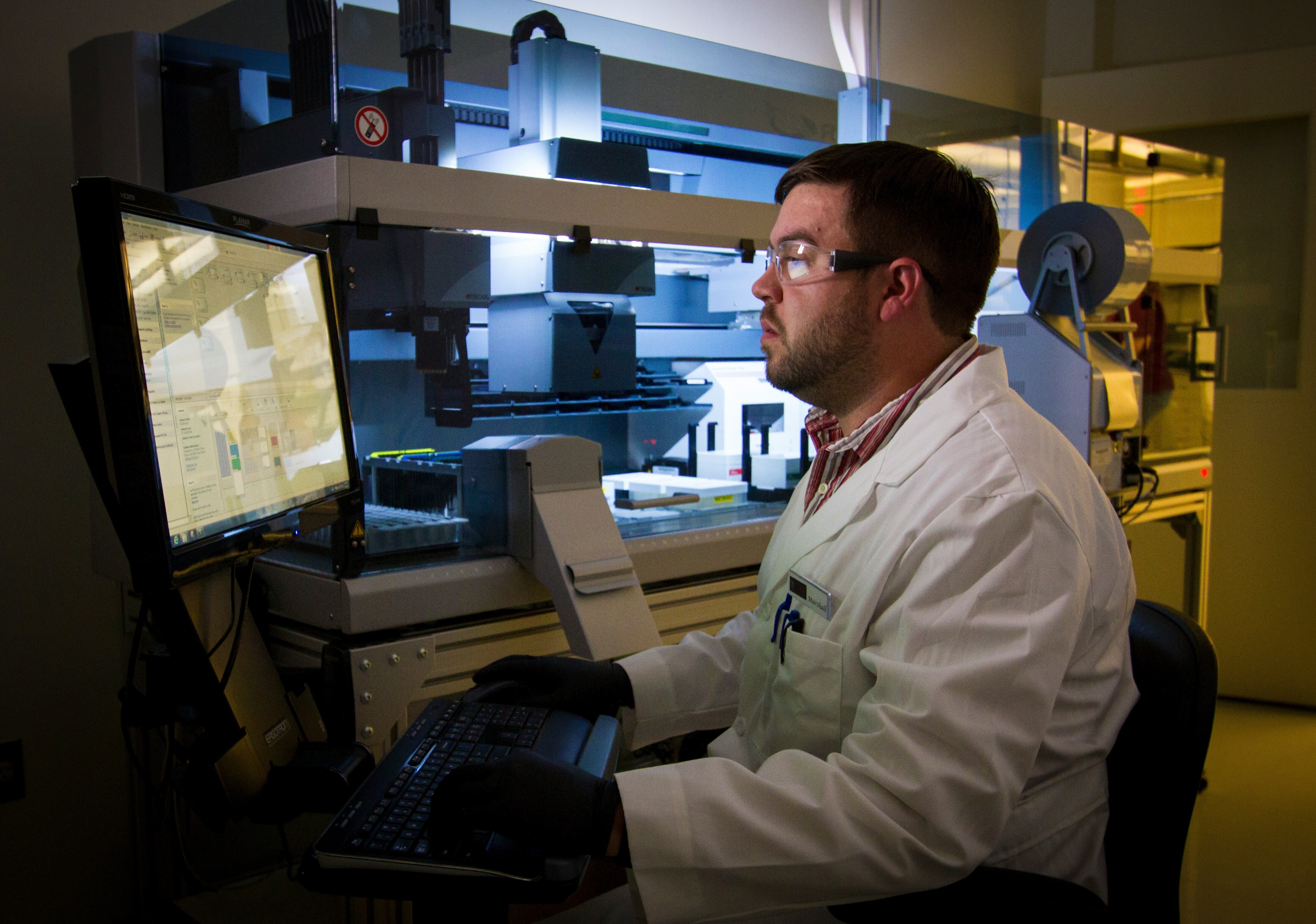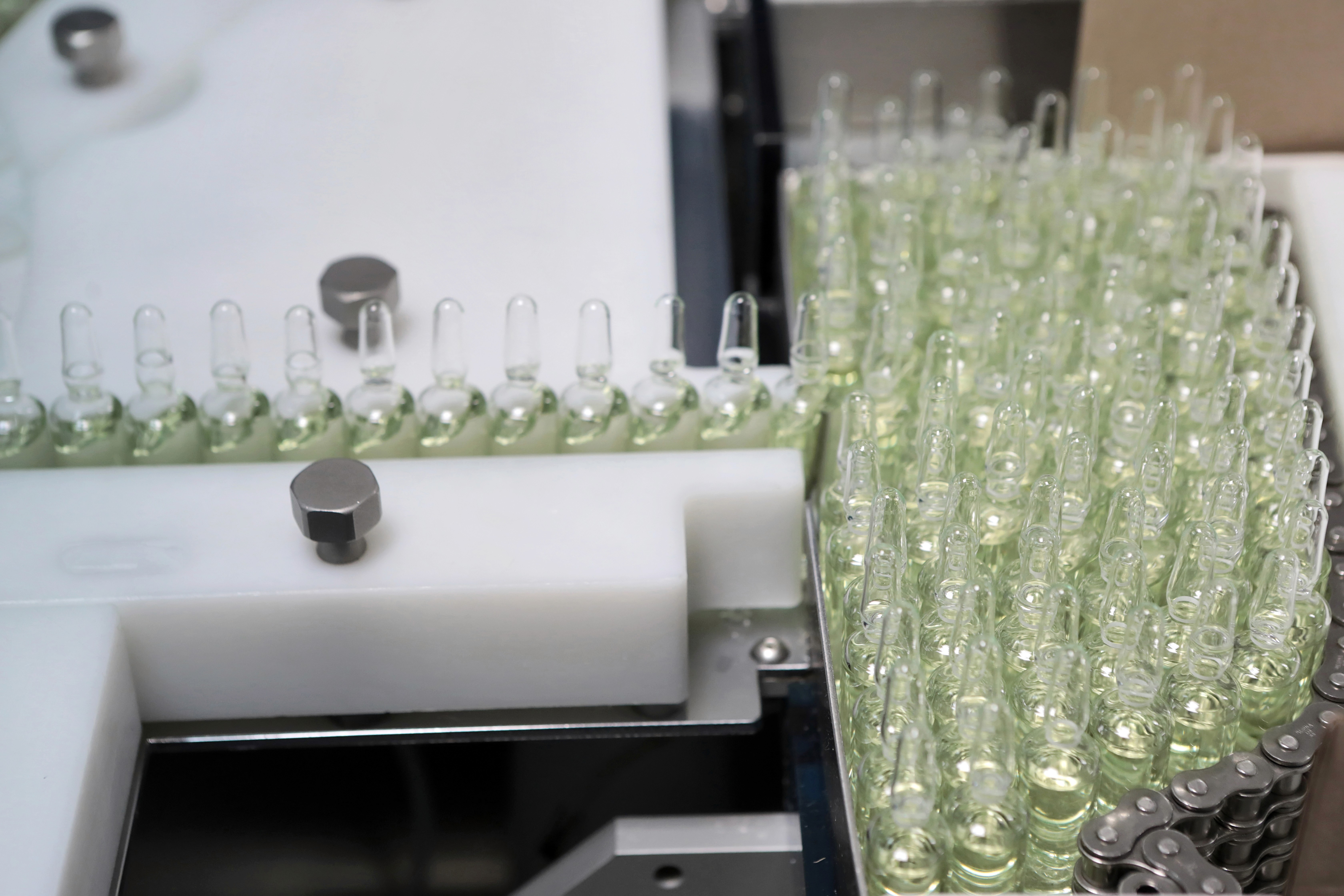Antigen discovery
Selecting the optimal antigens is essential in vaccine development because the immune response they trigger directly affects the strength and duration of protection against infections or diseases. Antigens can be chosen based on their ability to elicit a specific immune response, their broad efficacy against multiple pathogen variants, or their cross-reactivity within a pathogen family.

Antigen discovery
Selecting the optimal antigens is essential in vaccine development because the immune response they trigger directly affects the strength and duration of protection against infections or diseases. Antigens can be chosen based on their ability to elicit a specific immune response, their broad efficacy against multiple pathogen variants, or their cross-reactivity within a pathogen family.

Optimizing Vaccine Development
The SPOC platform facilitates comprehensive screening of patient serum or plasma samples against on-chip-produced whole proteome of the pathogen or the entire pathogen family, providing both quantitative and kinetic data. This enables the measurement of antibody response strength against each pathogen protein, aiding in the identification of immunogens (antigens) that elicit the most effective immune response—an important factor for successful vaccine development.
Optimizing Vaccine Development
The SPOC platform facilitates comprehensive screening of patient serum or plasma samples against on-chip-produced whole proteome of the pathogen or the entire pathogen family, providing both quantitative and kinetic data. This enables the measurement of antibody response strength against each pathogen protein, aiding in the identification of immunogens (antigens) that elicit the most effective immune response—an important factor for successful vaccine development.
Correlates of protection in pre-clinical and clinical studies

Streamlining Vaccine Trials
SPOC supports vaccine preclinical and clinical trials with a species-agnostic comprehensive immune profiling and immunogenicity assay, to identify correlates of protection. Data generated from SPOC screening of patient or animal serum samples includes quantitative antibody levels against each antigen, kinetic binding rates, and antibody isotypes (such as IgG1-4, IgA, IgM, etc.), all in a single run using less than 100 µL of serum.
Enhancing Immunogenicity Assessment
Additionally, using SPOC's proprietary chip format, comprehensive immune profiling is enhanced with quantitative measurements of cytokines and chemokines. SPOC biosensor assay developed for preclinical work also supports characterization of immunogenicity, efficacy, neutralization, and correlates of protection in Phase I-III clinical trials.
Correlates of protection in pre-clinical and clinical studies

Streamlining Vaccine Trials
SPOC supports vaccine preclinical and clinical trials with a species-agnostic comprehensive immune profiling and immunogenicity assay, to identify correlates of protection. Data generated from SPOC screening of patient or animal serum samples includes quantitative antibody levels against each antigen, kinetic binding rates, and antibody isotypes (such as IgG1-4, IgA, IgM, etc.), all in a single run using less than 100 µL of serum.
Enhancing Immunogenicity Assessment
Additionally, using SPOC's proprietary chip format, comprehensive immune profiling is enhanced with quantitative measurements of cytokines and chemokines. SPOC biosensor assay developed for preclinical work also supports characterization of immunogenicity, efficacy, neutralization, and correlates of protection in Phase I-III clinical trials.

Correlates of neutralization: antigen epitopes and antibody binding kinetics
The complexity and rapid evolution of pathogens pose significant challenges in vaccine development, particularly in identifying immunogens that broadly cover conserved targets. SPOC offers broad flexibility by relying solely on obtaining the DNA sequences of desired antigens, enabling the rapid inclusion of variants, including AI-designed, multivalent and patient-derived antigens.
By screening these pan-antigen chips with sera from patients, SPOC can identify antigens that are most immunogenic, that produce antibodies with high kinetic binding affinities, providing isotyping data for accessing type switching and maturity, to inform on immunogen selection.
Additionally, SPOC facilitates the production of comprehensive alanine-scanned mutational variants of selected immunogens directly on the chip. This enables precise screening with patient sera to identify specific epitopes that elicit antibody responses. The resulting epitope and kinetic data can be used to develop correlates of neutralization, aiding in vaccine development.

Correlates of neutralization: antigen epitopes and antibody binding kinetics
The complexity and rapid evolution of pathogens pose significant challenges in vaccine development, particularly in identifying immunogens that broadly cover conserved targets. SPOC offers broad flexibility by relying solely on obtaining the DNA sequences of desired antigens, enabling the rapid inclusion of variants, including AI-designed, multivalent and patient-derived antigens.
By screening these pan-antigen chips with sera from patients, SPOC can identify antigens that are most immunogenic, that produce antibodies with high kinetic binding affinities, providing isotyping data for accessing type switching and maturity, to inform on immunogen selection.
Additionally, SPOC facilitates the production of comprehensive alanine-scanned mutational variants of selected immunogens directly on the chip. This enables precise screening with patient sera to identify specific epitopes that elicit antibody responses. The resulting epitope and kinetic data can be used to develop correlates of neutralization, aiding in vaccine development.
Surveillance against new variants
Infectious diseases can mutate rapidly, leading to a reduction in vaccine efficacy against new variants, as observed during the COVID-19 pandemic. SPOC’s rapid cell-free synthesis method only requires the DNA or protein sequence of a new variant to integrate it into an existing or new biosensor chip within days.
With real-time high-throughput SPR screening, SPOC enables rapid screening against new variants as they emerge to determine risk or loss of efficacy of existing vaccines.
Surveillance against new variants
Infectious diseases can mutate rapidly, leading to a reduction in vaccine efficacy against new variants, as observed during the COVID-19 pandemic. SPOC’s rapid cell-free synthesis method only requires the DNA or protein sequence of a new variant to integrate it into an existing or new biosensor chip within days.
With real-time high-throughput SPR screening, SPOC enables rapid screening against new variants as they emerge to determine risk or loss of efficacy of existing vaccines.
For more information on the SPOC platform, get in touch:
Contact Us
1600 Adams Drive
Suite 236
Menlo Park, CA 94025
7201 E Henkel Way
Suite 285
Scottsdale, AZ 85255
480-219-9506
For more information on the SPOC platform, get in touch:
Contact Us
1600 Adams Drive
Suite 236
Menlo Park, CA 94025
7201 E Henkel Way
Suite 285
Scottsdale, AZ 85255
480-219-9506
Privacy & Conditions
All rights reserved © 2024

